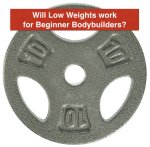How to Calculate Your Daily Protein Requirements for Building Muscle Mass
Proteins are the King of muscle building. But are you eating enough? Here is my simple and effective way to calculate your protein requirements accurately for fast muscle gains.
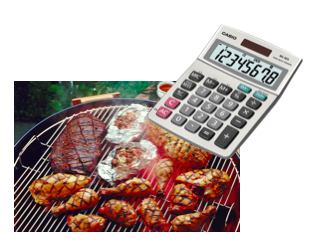
Your biggest muscle building nutrition challenge is to get the right quantity and quality of proteins on your plate every time you eat/drink.
Its easy to get your carbs right. Carbs are easy to get and easy to eat.
Fats creep into your diet without being noticed and good fats can be added with nuts/seeds and oils.
But proteins are tricky, especially when you consider the fact that you need to eat them 5-6 times a day and eat them in the right quantities!
But before that are you eating enough proteins or are your gains suffering due to poor protein intake?
This article will show you how to calculate your protein requirements using 3 simple methods.
Inside This Article:
- The Importance of Proteins for the Bodybuilder
- 3 Ways to calculate your protein requirements
- Which method to use for best gains
- How to distribute your proteins throughout the day
- Are high protein diets dangerous
- Recommended Programs for Building Muscle Mass
- Summary
The Importance of Proteins for the Bodybuilder
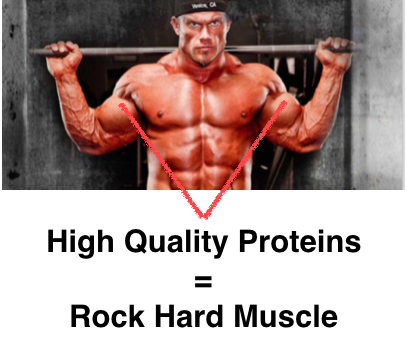
The Word protein comes from the Greek word Primary, means essential for life.
Its importance doubles for bodybuilders as we look to build our muscles with high quality proteins.
Although you can fill your muscles with water {hydration}, proteins are the real stuff that makes your muscles big, strong and tough.
Can you build a wall without bricks?
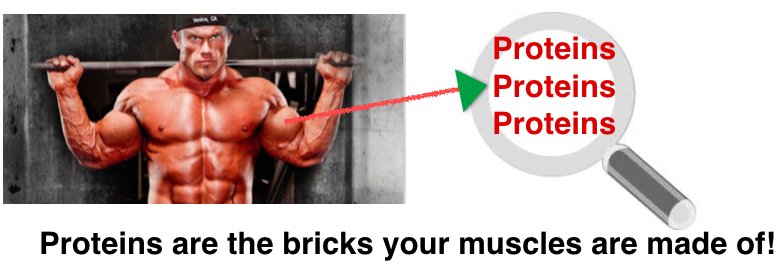
No. Similarly proteins make up the walls of your muscles and form structures called contractile elements that makes the muscle machinery useful for sport and movement.
No protein, no muscle. Poor proteins, poor quality, weak and small muscle. High quality, first class proteins build high quality dense muscles that are as strong as they look.
And understandably no other nutrient has received such attention as proteins.
If you want to build solid muscle mass, your diet CANNOT lack high quality, first class proteins.
Here's my trick: If you are not seeing muscle gains, I increase my client's protein intake slightly or improve on the protein quality.
Let's see...
3 Ways to Calculate your Protein Requirement

I will give you 3 ways to calculate your protein intake. I feel the first method to be excellent and practical and third to be optimal.
The second method is simple and a good starting point if protein is your area of weakness.
- Protein calculation as part of total energy intake
- One gram protein per lb of lean body mass
- Protein calculation as per muscle growth expected
1. Protein Calculation as part of Total Energy Intake
The first key to muscle building diet is your total energy/caloric intake {TEI].
No amount of proteins will suffice if your total energy intake is insufficient.
In the Muscle building nutrition section you learn how to calculate your total daily caloric intake. and from TEI you can calculate your recommended protein intake.
Let me give you an example:
Lets say your body weight is 140 lbs. So using total body weight your caloric intake should be:
140 X 20 = 2800 calories
Using the 40/30/20 formula, your protein intake should be:
840 calories = 210 g proteins per day.
Over 6 meals, you need 35 g of quality proteins.
This is an excellent way to calculate your protein requirements and builds a healthy muscle eating plan for you.
I use this method to calculate mine and my clients caloric and macronutrient intake.
2. Protein per pound lean body weight
This is a very simple method, has stood the test of time and a great starting point. It simply states eat at least 1 gram protein per pound of lean body weight.
Here's how it goes:
Calculate your lean body mass. Use a body fat callipers to find your exact body fat percentage.
Let me give you an example:
If you are 150 lb bodybuilder with 10% body fat, your lean body mass = 150 -15 {10% of 150 lbs is 15 lbs} = 135 lbs
As per this method, a 135 lbs {lean body mass} needs at least 135 grams proteins.
As you can see the protein calculated by this method is far lower than method one.
3. Protein requirement as per muscle growth expected
This is a tricky way to calculate your protein requirements.
It takes the second method and adds proteins required for future muscle growth.
Which is the Best Method?
In my opinion the first method of calculating protein requirement as part of total energy intake is best.
Here's why:
1. The key to muscle growth, i.e. your caloric intake is taken care of. Sufficient calories means weight gain. Sufficient quality calories ensures most of the weight you gain is lean muscle mass.
2. The protein intake calculated is higher than other 2 methods. Since protein is the key nutrient, I prefer higher intake as calculated by the first method.
How to distribute you protein intake throughout the day
Here's a secret. You need to calculate your meal by meal protein intake keeping in mind protein sensitivity and meal timing.
Now before I lose you, let me tell that its a lot easier with my method.
Lets continue with the example we used in the first method above.
A 140 lb bodybuilder needs 2800 calories, 840 calories from protein or 210 gram of proteins per day.
Divide this over 7 meals.
Using the above example, you need 30 g proteins per meal. and this is very doable.
Divide this protein over:
- 4 meals of 30 g proteins each
- 1 daytime shake with 30 gram proteins and
- 1 post workout shake with 60 gram proteins {You can it in 2 shakes, post workout shake 1 and 2}
The high protein shakes takes care of higher protein sensitivity after workout.
4 meals take care of your need for real, natural, muscle building foods.
One day time shake takes care of on the go eating/drinking.
One caveat: How to fit in 6 meals in a day?
My answer: Get up early. If you are up by 7 and sleep by 11, you have 16 hours to have your 6 meals. Eat every 3 hours and you are done for the day.
Are high protein diets dangerous?
For a normal healthy person who is a serious strength trainer like yourself, the high protein bodybuilding diet is safe. I have covered the topic in another article.
Recommended Muscle Building Programs
Muscle Building Nutrition Program
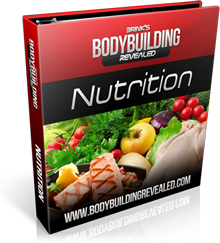
Will Brink's Muscle Building nutrition is the most complete nutrition plan for bodybuilders. Click here to find more.
Anabolic Cooking Muscle Recipes program

To build muscle you need high quality protein meals. Want 200+ tasty, anabolic muscle building recipes and meals? Then try the 200+ Anabolic Cooking Recipes here.
Muscle Building Transformation Program

Looking for a training + nutrition + supplementation plan for complete muscle building transformation? Then there is no program better than No Nonsense Muscle Building Program.
Summary and Action Points
Whenever you have to eat ask yourself. Where are my high quality proteins going to come from?
Why?
Firstly, Because proteins are hardest to get, meal after meal, day in and day out.
Secondly, select the best quality proteins you can. I have covered the best protein muscle building foods here.
Thirdly, master at least 5 muscle building lunch/dinner meal plans. I am mastering the Anabolic Cooking Recipes, one at a time. If you are serious about gaining muscle and living a healthier life, start cooking at least one meal a day.
Lastly, do not give up if you fail to get the right protein quantity or quality. Just like other things in life, you will adjust to the muscle lifestyle and when you do, life will never be the same.
I promise.
How Much Protein:
Brad Pilon's How Much Protein is the best resource I have found for all facts related to protein intake for muscle builders.
He is an Ex-Protein Supplement Developer And Research Scientist who agreed to 'reveal it all'.
Click here to read "How Much Protein".
Recent Articles
-
Bodybuilding Workouts & Muscle Building Workout Routines that Build Muscle
Jul 01, 17 09:52 AM
Discover effective bodybuilding workouts and muscle building routines with strategies to make every workout a killer one. Download free 3-day, 4-day or 5-day workout routines. -
Why Beginner Bodybuilders must use Light Weights for Muscle Gain
Jul 01, 17 09:44 AM
Discover the science why beginner bodybuilders must use light to moderate weights to gain maximum muscle mass in the first 2-3 months of training to gain muscle, prevent injuries and grow bigger. -
How to do a S.W.O.T Analysis of Your Bodybuilding Workout
Oct 26, 16 01:41 AM
Looking to take your bodybuilding workout to the next level? Then do a SWOT analysis of your muscle building workout to increase your lifts every workout.



